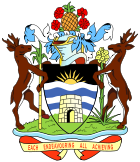
The politics of Antigua and Barbuda takes place in a framework of a unitary parliamentary representative democratic monarchy, wherein the sovereign of Antigua and Barbuda is the head of state, appointing a governor-general to act as vice-regal representative in the nation. A prime minister is appointed by the governor-general as the head of government, and of a multi-party system; the prime minister advises the governor-general on the appointment of a Council of Ministers. Executive power is exercised by the government. Legislative power is vested in both the government and the two chambers of the Parliament. The bicameral Parliament consists of the Senate and the House of Representatives.
The history of Antigua and Barbuda covers the period from the arrival of the Archaic peoples thousands of years ago to the present day. Prior to European colonization, the lands encompassing present-day Antigua and Barbuda were inhabited by three successive Amerindian societies. The island was claimed by England, who settled the islands in 1632. Under English/British control, the islands witnessed an influx of both Britons and African slaves migrate to the island. In 1981, the islands were granted independence as the modern state of Antigua and Barbuda.
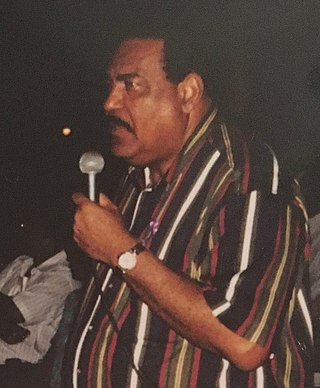
Sir Lester Bryant Bird was an Antiguan politician and athlete who served as the second prime minister of Antigua and Barbuda from 1994 to 2004. He was chairman of the Antigua Labour Party (ALP) from 1971 to 1983, then became prime minister when his father, Sir Vere Bird, the previous prime minister, resigned.

Sir Vere Cornwall Bird, KNH was the first Prime Minister of Antigua and Barbuda. His son, Lester Bryant Bird, succeeded him as prime minister. In 1994, he was declared a "National Hero".

The Antigua and Barbuda Labour Party (ABLP) is a political party in Antigua and Barbuda. The current leader of the party is Gaston Browne, who serves as the Prime Minister of Antigua and Barbuda. The party had previously been led by Lester Bird, who was chairman of the party since 1971, and was Prime Minister and political leader in 1994.
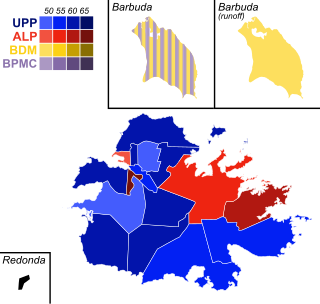
General elections were held in Antigua and Barbuda on 23 March 2004. The result was a victory for the opposition United Progressive Party (UPP), which defeated the incumbent Antigua Labour Party. Baldwin Spencer, leader of the UPP, replaced Lester Bird as Prime Minister of Antigua and Barbuda, with Bird being one of eight Labour MPs to lose his seat. Spencer became only the second Prime Minister from outside the Bird family or the Labour Party.
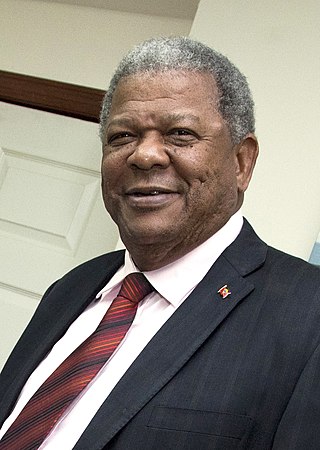
Winston Baldwin Spencer is an Antiguan politician who was the third prime minister of Antigua and Barbuda from 2004 to 2014.

Elections in Antigua and Barbuda take place in the framework of a parliamentary democracy.

The Progressive Labour Movement was a major centre-left political party in Antigua and Barbuda and, until the 2000s, was the only political party to have defeated the Antigua Labour Party in an election.
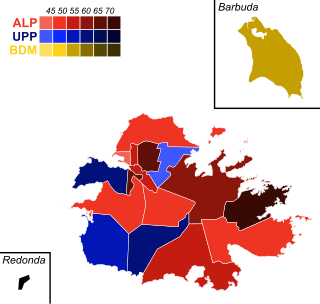
General elections were held in Antigua and Barbuda on 9 March 1999. The elections were won by the governing Antigua Labour Party. Lester Bird was re-elected Prime Minister of Antigua and Barbuda. Voter turnout was 63.6%.
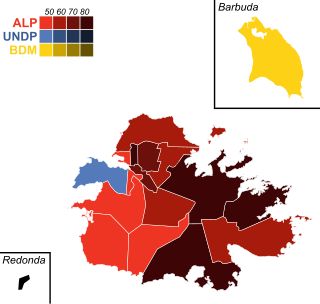
General elections were held in Antigua and Barbuda on 9 March 1989, the second after it had become an independent Commonwealth realm. The elections were won by the governing Antigua Labour Party (ALP), whose leader Vere Bird was reelected as Prime Minister. Voter turnout was 60.7%.

General elections were held in Antigua and Barbuda on 17 April 1984, the first after the country had become an independent Commonwealth realm in 1981.

General elections were held in Antigua and Barbuda on 1 November 1956. The Antigua Labour Party retained all eight elected seats and the party's leader Vere Bird became Minister of Trade and Production after a ministerial system of government was established. Voter turnout was 57%.

General elections were held in Antigua and Barbuda on 29 November 1960. They were won by the governing Antigua Labour Party (ALP), whose leader Vere Bird was re-elected as Chief Minister, a position he had held since 1 January 1960 when the position was created.

General elections were held in Antigua and Barbuda on 29 November 1965, and continued on 15 December after three candidates withdrew before the original date. They were won by the governing Antigua Labour Party (ALP), whose leader Vere Bird was re-elected as Chief Minister.

General elections were held in Antigua and Barbuda on 11 February 1971. They were won by the Progressive Labour Movement. PLM leader George Walter was elected Premier of Antigua, defeating the incumbent Premier Vere Bird of the Antigua Labour Party. The PLM was founded in 1967 after a split in the leadership of the Antigua Trades and Labour Union; this was its first election, as well as its first and only electoral victory.

General elections were held in Antigua and Barbuda on 24 April 1980. They were won by the governing Antigua Labour Party. ALP leader Vere Bird was re-elected as Prime Minister of Antigua and Barbuda. Voter turnout was 77.1%.
Vere Bird Jr. was an Antiguan lawyer and politician who served as chairman of the Antigua Labour Party (ALP) and a government minister. He was the son of Vere Bird, the former Prime Minister of Antigua and Barbuda, and brother of Lester Bird, who later held the same position.
Sir Robin Yearwood KGCN is an Antiguan politician and member of the Antigua Labour Party (ALP). Entering Parliament in 1976, Yearwood served as Minister of Agriculture, Land and Fisheries in the ALP administration until a cabinet reshuffle in 1987 saw him take over Vere Bird, Jr.'s portfolio for Aviation, Public Information and Public Utilities. Despite a failed attempt to oust the Prime Minister he retained this position, and kept it when he became Deputy Prime Minister on 9 September 2002 and Minister of Finance a year later. Following the ALP's loss in the 2004 election, Yearwood was one of only three ALP members left in the lower house, and became Leader of the Opposition. He held this position until 2006, when he was replaced with Steadroy Benjamin.

Maria Vanessa Bird-Browne is a politician in Antigua and Barbuda. She was elected as a member of the House of Representatives for St. John's Rural East in the Parliament of Antigua and Barbuda in 2018, becoming the youngest lawmaker in the country. She is the country's minister for housing, lands, and urban renewal.

